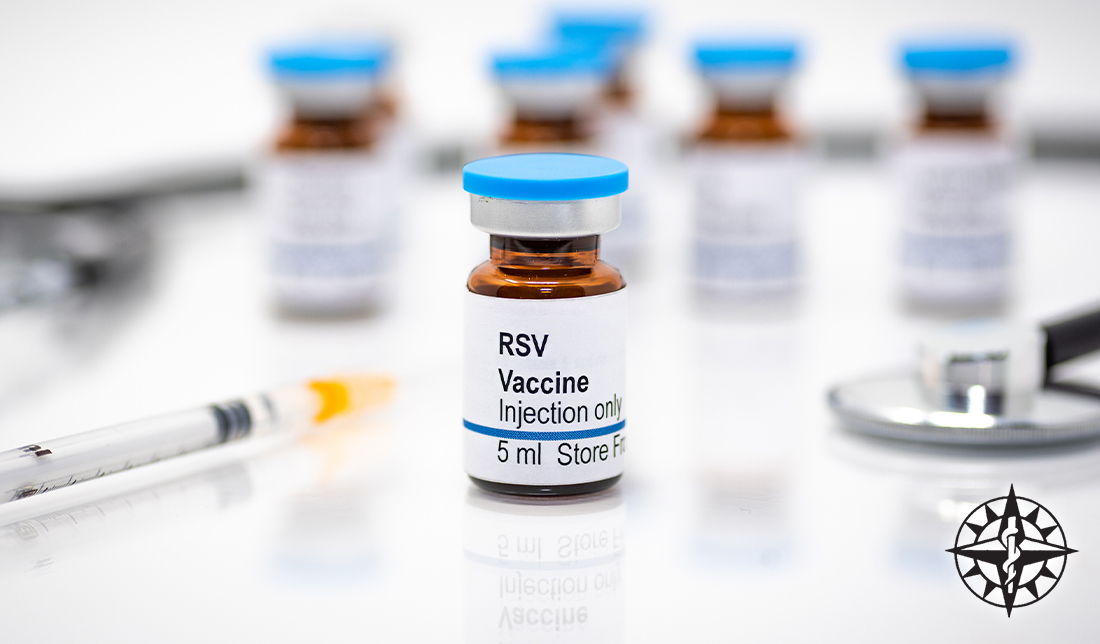Published on: August 16, 2023
Offering Newborns Protection Against a Severe Respiratory Virus
Respiratory syncytial virus, often known simply as RSV, is an unchecked yet under-discussed pathogen that poses a significant health risk to our most vulnerable population: infants. Although seemingly harmless to many adults, this tiny virus can lead to severe disease in infants and the elderly, causing an alarmingly high rate of hospitalizations and, tragically, even fatalities. Every year, in the United States alone, thousands of young lives are disrupted as this invisible menace wages a silent war against our defenseless newborns.
Within the medical community, there is an urgent cry for solutions, for ways to protect these innocent lives from the ravages of severe RSV disease. One company, Pfizer has been on a search to devise a solution to this widespread issue. Their thorough research and development resulted in a new, promising RSV vaccine named Abrysvo.
Abrysvo isn’t just another vaccine. It embodies a novel approach to RSV prevention as it’s administered not directly to infants but to pregnant women. This groundbreaking method seeks to protect newborns right from the onset of life, arming them against RSV even before they step into the world.
Recently, this innovative vaccine has been investigated by an advisory panel of the U.S. Food and Drug Administration (FDA), the organization responsible for regulating and approving new drugs in the United States. The evaluation process is rigorous and meticulous, and the eyes of medical professionals worldwide are on the panel’s decision.
In this blog post, we dive deep into RSV and this promising new vaccine. We explore the details of Abrysvo, its research, its demonstrated efficacy in clinical trials, any potential safety issues that have arisen, and the broader implications of its possible approval for infant health. It’s time to bring RSV out of the shadows and shine a light on the hope that Abrysvo may provide.
Understanding RSV and its Impact on Floridians
RSV primarily targets infants and young children. Symptoms can vary from mild, cold-like manifestations to severe respiratory distress. According to the CDC, between 58,000 and 80,000 children under five are hospitalized yearly due to RSV in the U.S., with up to 300 succumbing to the illness. Infants aged six months or younger are particularly vulnerable to severe RSV illness.
Respiratory Syncytial Virus (RSV) poses significant risks to both infants and the elderly, with those living in Florida being no exception. For infants, RSV is the leading cause of bronchiolitis and pneumonia among those under one year of age. In Florida, statistics from the most recent years show a notable surge in RSV infections during the winter and early spring. For example, in 2022, Florida saw over 30,000 hospitalizations among infants due to RSV, with mortality rates slightly higher than the national average. This high incidence can be partially attributed to Florida’s climate, which enables the virus to thrive longer than it does in colder regions.
Here are the top five symptoms of RSV in infants, so parents can recognize them early and seek prompt medical attention:
- Difficulty Breathing: Infants may exhibit signs of having difficulty breathing, including rapid breaths, flaring nostrils, or a caved-in chest between and under the ribs.
- Cough and Congestion: A persistent cough or congestion which may worsen over time is a common symptom.
- Decreased Activity or Lethargy: Infants may be unusually tired, have low energy levels, or show a decreased interest in their surroundings.
- Decreased Appetite: There may be a noticeable decrease in the infant’s desire to eat, which can lead to dehydration.
- Fever: A high temperature, usually over 100.4°F is often a sign of infection, and RSV is no exception.
For the elderly population in Florida, the risk of severe RSV infection is also alarming. Older individuals, particularly those with underlying health conditions, are susceptible to severe RSV infections leading to pneumonia, chronic obstructive pulmonary disease (COPD), and other respiratory complications. State records from the past few years reveal that nearly 20% of hospitalizations for acute respiratory infection among Florida’s elderly population were associated with RSV. Moreover, during the peak RSV season, the virus contributed to roughly 10% of deaths among Floridians aged 65 and older. The statistics underline the severity of RSV in Florida and the need for heightened preventive measures.
The Promise and Apparent Efficacy of the RSV Vaccine
Unlike traditional vaccines given directly to infants, Pfizer’s innovative approach with Abrysvo involves immunizing pregnant women between the 24th and 36th week of pregnancy. The idea is that by vaccinating the pregnant woman, protective antibodies are transferred to the fetus through the placenta, thereby shielding the newborn from severe RSV disease during the crucial first months of life.
Pfizer’s clinical trials reveal promising results. “In a study involving approximately 7,400 pregnant individuals, we observed an efficacy rate of 81.8% in preventing severe respiratory illness caused by RSV in infants during the first three months post-birth,” says Dr. Nina Patel, Pfizer’s Head of Vaccine Research. The efficacy rate remains substantial at 69.4% for the first six months, suggesting Abrysvo’s potential to decrease the incidence of severe RSV illness in newborns significantly.
Recently on Good Morning America, Dr. Jen Ashton, ABC News’ leading medical correspondent, offered insight into the decision made by FDA advisers endorsing Pfizer’s RSV vaccine intended for pregnant women. Take a look below:
Safety Concerns and Preterm Births
Despite promising efficacy, safety concerns have emerged. Pfizer’s trials and a previous trial by GlaxoSmithKline (GSK) suggested a potential association between the vaccine and a slightly elevated rate of premature births. Although the difference was not statistically significant, several experts voiced concerns about the potential impact on preterm births.
The FDA advisory panel meticulously assessed the available safety data for Abrysvo. Members of an FDA advisory panel voted in support of Pfizer’s respiratory syncytial virus (RSV) vaccine (Abrysvo) for the prevention of RSV in infants via administration to pregnant women, however some expressed reservations about the sufficiency of the data and the possible implications for preterm births. To alleviate these concerns, Pfizer pledged to monitor health records for cases of preterm birth and other potential health issues if the vaccine is approved. However, some panel members question the reliability of using healthcare billing records for such monitoring purposes.
FDA Decision and Implications
Considering the panel’s recommendations, the FDA will now decide whether to approve Abrysvo for use in pregnant individuals. While the FDA isn’t obligated to follow the panel’s advice, it typically factors their insights heavily into its decision-making process. Abrysvo could be a significant milestone in RSV prevention, offering pregnant individuals a way to protect their infants from severe RSV illness during their vulnerable early months of life.
Emerging Trends and Future Research
Apart from Pfizer’s Abrysvo, several other pharmaceutical companies are also developing RSV vaccines. Novavax and Sanofi are among the global giants conducting advanced trials of maternal vaccines to prevent RSV disease in newborns. In addition to vaccines, antiviral treatments, and the potential of monoclonal antibodies to provide immediate short-term protection against RSV are under investigation. “A multi-pronged approach that includes vaccination, antiviral treatment, and immunotherapies could be the key to reducing the global burden of RSV,” believes Dr. Andrews.
The introduction of an effective RSV vaccine could not only prevent thousands of hospitalizations and deaths but could also significantly reduce healthcare expenditures related to RSV. Moreover, by preventing serious RSV disease, an effective vaccine could alleviate economic hardships faced by parents who must take time off work to care for their infants with severe RSV infections.
Given the novelty of administering vaccines to pregnant individuals to protect newborns, healthcare professionals and the public will need proper education about this practice. This education will ensure that if approved, the uptake of the RSV vaccine will be maximized, leading to the greatest possible impact on infant health.
Final Thoughts
Despite the challenges and concerns, the development and potential approval of an RSV vaccine like Pfizer’s Abrysvo mark a significant step forward in infant health. As Dr. Parsons noted, “The efforts to create and implement an RSV vaccine for newborns signify one of the most transformative moments in pediatric healthcare.”
With cautious optimism, we look forward to a world where RSV no longer poses a significant risk to our children’s health. The potential of an RSV vaccine to dramatically reduce the risk of severe disease and mortality in infants is undeniable. It promises a future where every child is given the best possible start in life, free from the threat of RSV.
About Infectious Disease Associates of Tampa Bay (IDATB)
IDATB is committed to delivering top-tier healthcare services to patients throughout the Tampa Bay region. With a legacy of over three decades, IDATB has been serving Floridians dealing with infectious diseases, further complemented by an on-site laboratory for required testing. Should you have any questions related to RSV or worries regarding other health conditions, feel free to reach out to us at 813-251-8444. Our highly trained team of healthcare professionals is ready to provide you with the comprehensive care and knowledge you need.





